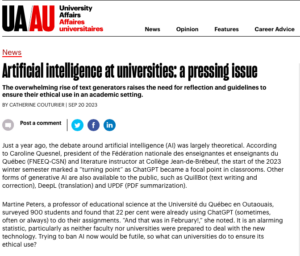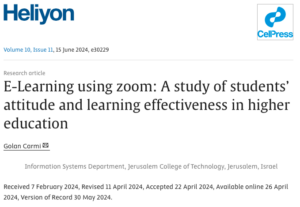Open Learning Principles Guiding the Way to Accessible and Inclusive Learning
Open Learning Principles have had huge impacts on the accessibility and inclusivity of learning. This became more apparent to me through the Covid-19 pandemic and through my work as a behavioural interventionist working with children and families on the Autism spectrum. For many of these children, they have struggles learning in structured classroom settings and often need extra assistance with their course work and keeping focused. By making learning accessible online, it allows for parents or support workers to give the extra support from the comfort of their home and eliminating the typical distractions of being in a classroom. I found this weeks reading called Twenty Years of Edtech, to be very interesting. Mainly when looking at the comparison of how technology was before I was born and how limited the ways of learning were, to how crucial it is in todays school systems.
The Controversy Surrounding AI as an Educational Resource

https://universityaffairs.ca/news/news-article/artificial-intelligence-at-universities-a-pressing-issue/
The topic of AI being used as an educational resource has been an extremely controversial topic for many Universities. I personally have never felt the need to use such systems in completing any of my academic work. However, I do feel as though it can be a very powerful tool, when used in an appropriate manner. I have met many people throughout my time in University that have used AI as an educational resource, but none that use AI in the ways that it had been portrayed through the media. Most people admitted to mainly using it to spark ideas that they could further research or to help summarize the main points of lengthy articles. I believe this is where the controversy comes in, as would this be considered a breach of academic conduct? In an article by Catherine Couturier, she speaks directly about this controversy and details some of the different pros and cons of AI use and some suggestions for safer use of this tool. One of the quotes that really stood out to me was, “For years, we didn’t teach how to do proper web searches. If we want our students to use AI ethically, we have to show them how, and right now nobody seems to be taking that on” (Couturier, 2023). I found this to be an incredibly true statement because without being taught how to properly use potentially helpful education resources and the pros and cons of these tools, students are left to their own devices to figure these things out, which may not always be in aligns with academic conduct. (Find Article Here)
How the Pandemic Helped to Advance Digital Learning
Despite the many devastating and lasting struggles that came along with the Covid-19 pandemic, it also worked to advance the means of open learning. The pandemic forced educators to find and create ways to deliver their classes in a way that would be accessible to their students from home and in a way to accommodate the variety of different learning environments the students would be connecting from. One of the most useful advancements during this time was the use of Zoom. This platform allows people to connect in a video setting where they are able to share screens, record the meetings, manage waiting rooms, put their students in breakout rooms, and so much more. While doing research on this topic, I came across this study that was done on the learning effectiveness of using Zoom and how it was able to increase students attitudes towards learning in higher education. (Find Article Here)

Leave a Reply